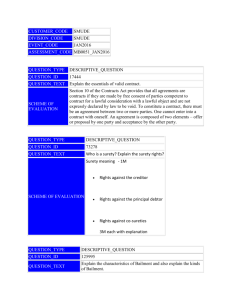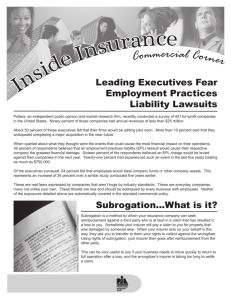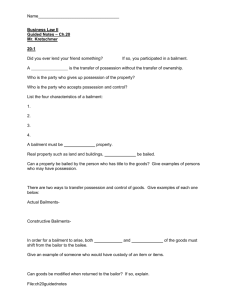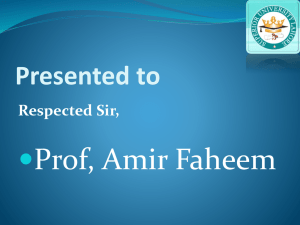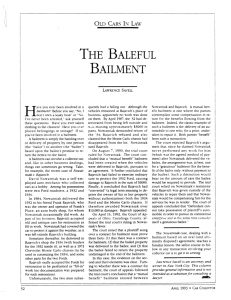Chapter 8
advertisement
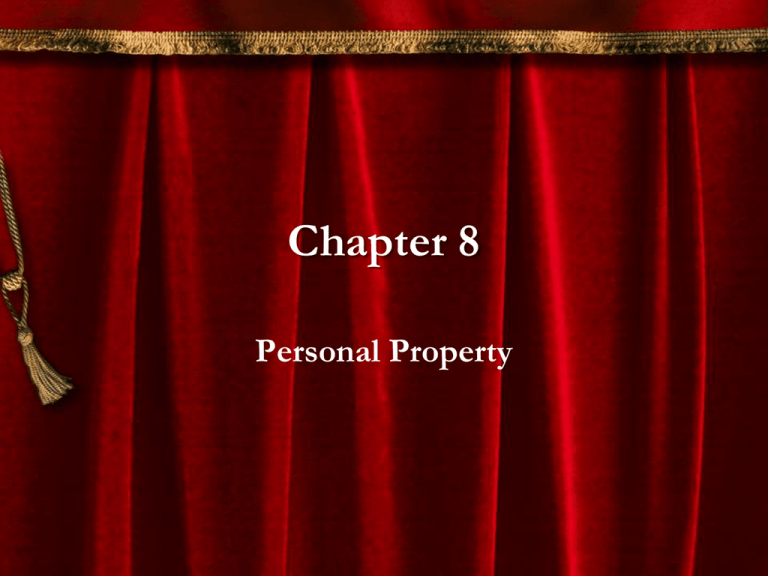
Chapter 8 Personal Property Personal Property • Is everything, other than real property (land, buildings, the earth below and the air above, items permanently attached to real property such as stoves and kitchen cabinets) that can be owned. • Tangible personal property is property that has substance and can be touched, such as a CD player, vehicle or food. • Intangible personal property is property that has no substance and cannot be touched, such as patents, copyrights, and trademarks. Most Property is acquired by: • Purchase • Gift • Inheritance Co-Ownership of Personal Property • When two or more people own personal property as tenants in common, each owner’s share passes to his or her heirs upon death. • If the property is owned as joint tenants, each owner’s share passes to the surviving joint tenants upon death. • Community Property (recognized by 9 states) is property acquired by the personal efforts of either spouse during marriage, it belongs to both spouses equally (except a gift or inheritance). Lost Misplaced and Abandoned Property • Lost Property: If you find a lost item you have a legal duty to find the true owner. After following the local requirements, if the owner is not located, you may keep the item. • Misplaced: If an item is found in a store or restaurant you must notify the proprietor and leave it with them. • Abandoned Property: property discarded by the owner with the intent to reclaim it, you may keep it. Stolen Property • A person has no title to goods that are stolen and cannot give good title to anyone else. • If you purchase a stolen item in good faith (you didn’t know it was stolen) you are obliged to return it to the owner. • Owner of the stolen goods has the legal right to regain possession. Gifts of Personal Property • A gift of Personal Property is completed when three requirements are met: • The donor (gift-giver) must intend to make the gift • The gift must be delivered. • The donee (gift-receiver) must accept the gift. Once all the requirements are met, the gift cannot be taken back by the original owner. Intellectual Property • Is an original work fixed in a tangible medium of expression. – Example: Inventions, Works of Art, Software and logos. • The increase of computers has made Intellectual Property laws extremely important. • Patents, Copyrights and Trademarks assure that the rightful owners of intellectual property will have exclusive rights to their creations. Patents • Is a grant giving an inventor the exclusive right to make, use or sell an invention for a period of time set by Congress. • The time period is usually 20 years. To be patented a device must be useful and consist of a new principle or idea. • It must not be obvious to people with ordinary skill in the field. Patents • Example: In 1999, Smucker’s Company obtained a patent on Uncrustables – Frozen, crustless peanut butter and jelly pockets. Later, the company sought to expand its patent, arguing that the sealed edge was one of a kind. The court held against the expansion, saying that the crimped edges on Uncrustables are similar to ravioli or pie crust. The patent office said it would reexamine the original patent given to Smucker’s. Copyrights • Is a right granted to an author, composer, photographer, or artist to exclusively publish and sell an artistic or literary work. • Printed items, computer software, graphic arts, architectural designs, motion pictures, and sound recording. Copyrights • Copyrighted works are protected for the life of the author plus 70 years. • Under the fair use doctrine, copyrighted material may be reproduced without permission in certain cases. • Literary criticism, news reporting, teaching, school reports, and other research. • The amount of and use of the material must be reasonable and not harmful to the copyright owner. Trademarks • Is a distinctive mark, symbol, or slogan used by a business to identify and distinguish its goods from products sold by others. • May consist of a Word, Name, or Symbol that has been adopted as a trademark. • A trademark continues for 10 years and can be renewed for an additional 10 years. • The symbol ® indicates that a trademark is legally registered. Bailments • Is a transfer of possession and control of personal property to another with the intent that the same property will be returned later. • The person who transfers the property is the bailor; the person to whom the property is transferred to is the bailee. • There is NO intent to pass title to property. • The Bailee must return the property to the Bailor. • The bailee has a responsibility to exercise a certain standard of care of the property. The standard of care depends on who receives the most benefit from the bailment. There are three types of Bailment: • Special • Gratuitous • Mutual Benefit Special Bailment • Special Bailment: is a bailment for the sole benefit of the bailee. • If you borrow a friend’s laptop, with nothing offered in return, you alone benefit from the bailment. This type of bailment requires great care. You (bailee) are liable for any kind of damage to the laptop while it is in your possession. Gratuitous Bailment • Gratuitous Bailment: Is a bailment for the sole benefit of the bailor. • Your friend asks you to hold their watch while they go swimming. Since your friend, as the bailor, is receiving the sole benefit, you are required to use only slight care and can only be held liable for gross negligence. If the watch is either scratched or stolen you are not liable. Mutual Benefit Bailment • Mutual Benefit Bailment: is a bailment in which both the bailor and the bailee receive benefits. • If you (bailor) leave your car at the garage to be repaired, and the mechanic (bailee) will receive payment for the service. This would require reasonable care, care a reasonable person would use. Sale-on-Consignment and Saleon-Approval • Type of mutual benefit bailment • The consignor entrusts goods to the consignee for the purpose of selling them. • If the goods are sold, the consignee forwards the proceeds, minus a fee, to the consignor. • If the goods are not sold they are returned to the consignor. Tortious Bailees • Bailees have the right to use the bailors property for the purpose for which the bailment was created. • Use for another purpose or for a longer time than agreed upon is a wrongful act. • Tortious Bailee: someone who holds property wrongful. – Includes someone who keeps someone else’s stolen property or knowingly possesses stolen property, or refuses to return property at the end of a bailment. Burden of Proof • If items are damaged while in the hands of the bailee, the bailor is not in a position to know what caused the lost. • If a bailor brings suite for damages, courts shift the burden of proof to the one who is in the best position to know what happened, the bailee. • Burden is on the bailee to prove lack of evidence. Special Bailments • HotelKeepers and Common Carirers Hotel Keepers • A hotelkeeper is the operator of a hotel, motel, or inn that regularly offers rooms to the public for a price. – If rooms are available, a hotel keeper must accept all people who are not dangerous to the health, welfare, or safety of others and go are able to pay their lodging. The Civil Rights Act makes it illegal to discriminate, refuse a room, to anyone on the grounds of race, creed, color, gender, or national origin. Hotel Keepers • Hotels and Motels must provide a minimum standard of comfort, safety, and sanitation. – Minimum Standards include, heat and ventilation, clean beds, and reasonable quiet surrounds. Guests are guaranteed the right to privacy. – With exceptions, hotelkeepers are held by law to be insurers of their guests’ property. In the event of a loss, the hotelkeeper may be held liable, regardless of the amount of care exercised. Hotel Keepers – Exceptions: • Losses caused by as guest’s own negligence. • Losses to the guest property due to acts of the public enemy (such as terrorists or wartime enemies). • Loss of property because of accidental fire in which no negligence may be attributed to the hotelkeeper. Hotel Keepers Lien on Credit Card Blocking • If a guest cannot pay their bill, the hotelkeeper may hold the guests property as security for payment at a later date. • Credit Card Blocking: Guests are asked for a credit card number when they register. The hotel contacts the credit card company with the estimated cost of the bill. If the card company approves the transaction, the guest’s available line of credit reduced by the estimated amount. The actual charge takes place after the guest has checked out. Common Carriers • A Carrier is a business that transports persons, goods, or both. • Common Carrier is a carrier that is compensated for providing transportation to the general public. • Cannot turn people away who ask for their services. Common Carriers of Goods • Liable for damages regardless of whether they are negligent, unless the damage is a result of an act of God, the public enemy, public authorities, the shipper, and the inherent nature of the goods. Common Carriers • Common carriers: – are not required to accept goods they are not equipped to carry. – may refuse goods that are inherently dangerous. – may refuse goods that are improperly packaged. – may refuse goods that are not delivered at the proper place and time. – Common carriers will not be excused from liability for losses due to strikes, mob violence, fire and other similar causes. – The carrier may sell the goods if the shipper and/or the party selling the goods refuses or does not to pay. Common Carriers for Passengers • Responsible for protecting passengers. • Not responsible is the injuries are unforeseeable or unpreventable. • Airlines must screen passengers and luggage; anyone who refuses must be refused transportations. Bumped Airline Passengers • Bumped passengers may be entitled to compensations plus the money back for their tickets. Baggage • Common carriers are required to accept a reasonable amount of baggage per person. • You may ship excess baggage for a fee. • Lost luggage: maximum liability is $2500.00.
